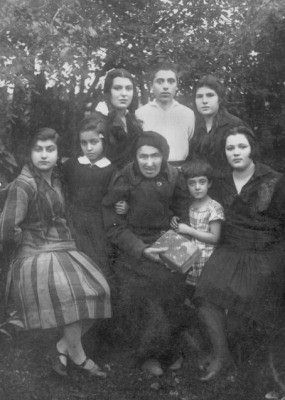
|
From right to left, standing: Itale Orlin, Micha Slep and his sister Miryam.
Seated: Henya Slep, Teibele (daughter of Yosef and Freidl) Levitt, Itale Charit and her sister Zeldka
|
[Pages 99-100]
Esther Pomus (Orlin): Grandfather Hanoch Chatzkel and Grandmother Sore-Beile (nee Katz) lived in a house beside ours. When grandfather entered our house, everyone rose in respect. He had nineteen grandchildren in Dusiat, and another two in Rakishok (Rokiskis). He was very proud of his grandchildren.Yosef Yavnai (Slep): Grandfather Hanoch was highly respected in the shtetl, and his opinion carried weight. I was told that after the fire, it was my grandfather who drew up the plans for the new synagogue.
Esther Pomus (Orlin): My grandmother would always hold the book “ Korban Minha” in her hand. I prayed with her every morning, and that is how I learned all the prayers by heart.
Grandfather Hanoch, who was considered very knowledgeable, used to make fun of grandmother and berate her, saying that she was sinning greatly in her prayers which might “destroy God's glory” (yashmid tehilath hashem), because she didn't understand what was written, and read everything in one breath, with no attention to punctuation…
On Saturdays, between Minha and Ma'ariv (the afternoon and evening prayers), before we lit the lamps in the house, my grandmother would tell us her stories. When she related her family tree, it almost seemed that brothers had married sisters…
My grandmother was very good-hearted, and everyone loved her. When she was ill, we didn't leave her bedside, taking turns to sit with her.
Rivka Friedman (Orlin): Grandmother Sore-Beile read a lot, especially the Book of Psalms, and she would cry until her eyes grew red. Grandfather would comment to her: “Why are you crying? It's written 'Then Moses sang'.”Esther Pomus (Orlin): Grandmother used to tell us that she had a good voice and sang well, but that it was forbidden to hear her voice, because a woman's voice is a shameful thing (in religion).
Yaacov Charit: Grandmother used to say: “Lift up your voice in front of the whole world and shout 'I am alive!'” Then she would immediately add: “It will do as much good as cupping-glasses to a dead man”…
When the members of the youth movement in Dusiat used to go to scout camp, “di einiklech” (the grandchildren) had an important place there, because the children of the Slep, Orlin and Charit families were there, and everyone knew that they had better not touch one of “der Bobes Einiklech” (“grandmother's grandchildren”), as we were called.
Masha Gershuni (Slep): The Charit family lived on our street. My brother lived in their house, and Itale Charit was in my class and used to help me with my schoolwork, so that I knew them well. I was especially impressed by their wonderful relationship with their grandmother, Sore-Beile, and most of all I was amazed by Zeldka Charit's devotion to her grandmother. In my mind I can see the grandchildren gathering around her on Friday night. How respectfully they behaved towards her! They didn't address her in the familiar form “ du” but in the formal form “ Ir”.
|
Grandmother Sore-Beile Chazkel (Katz) with her young grandchildren (Kislev 5688).
From right to left, standing: Itale Orlin, Micha Slep and his sister Miryam.
Seated: Henya Slep, Teibele (daughter of Yosef and Freidl) Levitt, Itale Charit and her sister Zeldka |
|
Catchwords in Yiddish spiced with Hebrew … “ Fun klein parnosse vert men oich nit b'daleth” Even a small income keeps you from poverty. “Oremkeit iz nisht kein bushe, ober oich nisht kein naches” Poverty is not a disgrace, but neither is it a pleasure. “Nit fun naches lebt men, un nit fun tzores shtarbt men” You don't live from pleasure, nor die from troubles. “Mit geld un yerushe ken zich teilen mitn teivel havrute” With money and inheritance you can join the devil's company. A gaave ligt oif mist, un ver es vill nemt umzist” Pride lies in the trash, and whoever wants it, can take it free of charge. “Drei mol in yor iz shlecht dem oreman: zumer un vinter, un ven s'kumt unter” Things are bad for the poor man three times a year: summer and winter, and whenever it happens. “A milchiker tepl beim oreman vert kein mol nit fleishik” A poor man's dairy pot never becomes a meat one.
|
|
JewishGen, Inc. makes no representations regarding the accuracy of
the translation. The reader may wish to refer to the original material
for verification.
JewishGen is not responsible for inaccuracies or omissions in the original work and cannot rewrite or edit the text to correct inaccuracies and/or omissions.
Our mission is to produce a translation of the original work and we cannot verify the accuracy of statements or alter facts cited.
 Dusetos, Lithuania
Dusetos, Lithuania
 Yizkor Book Project
Yizkor Book Project
 JewishGen Home Page
JewishGen Home Page
Copyright © 1999-2026 by JewishGen, Inc.
Updated 9 May 2009 by LA